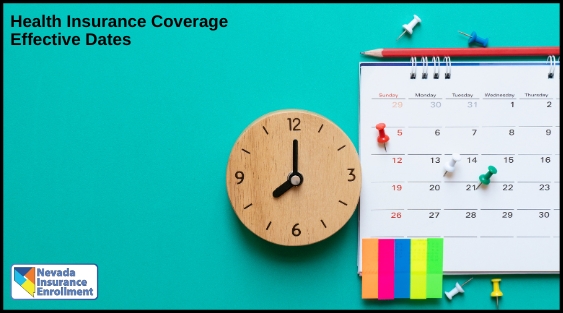How Long Do You Have To Wait For Your Health Insurance?
Once you have picked a health insurance policy and paid your first month’s premium, you probably expect your coverage to begin immediately. However, depending on when you enrolled and under what circumstances, you may have several weeks before your health insurance coverage takes effect.

When Does Health Insurance Coverage Begin?
Your health insurance plan’s effective date is the day your coverage begins. Usually, your health insurance policy coverage will begin the 1st of the month following your enrollment. It may be different depending on many factors. Ask your human resources representative at your job, or your health insurance agent (if you had an agent help you buy a plan), when your policy begins. “Qualified Health Plans” for the most part begin on the 1st of the month. This is true for Medicare, and any Qualified Health Plans. If you enroll during “Open Enrollment” for individuals and families between November 1st and December 31st, your plan will begin January 1st.
Depending on your policy, this is the date when your medical costs that you pay, such as, co-pays, coinsurance, prescription drugs co-pays, or any money you spend on qualifying health care services, counts towards your deductible and annual out-of-pocket limit.

Types of Enrollment Periods
There are two types of enrollment periods. The period in which you sign up for coverage affects when coverage begins.
Open Enrollment Period
The Open Enrollment Period normally runs from November 1 through January 15th each year but can change. When you enroll in November or December, your health insurance takes effect on January 1st. If you apply on or after January 1st through January 15th (which is the last day to enroll during open enrollment) your coverage will begin February 1st. After January 15th each year, you’ll need an “SEP” to enroll.
Special Enrollment Period (SEP)
If you sign up for a new policy outside of the yearly open enrollment period, you must have a qualifying life event. A “Qualifying Life Event” can be getting married, having a baby, moving into Nevada and losing your coverage, etc. You’ll have a Special Enrollment Period of 60 days to start a new plan. The coverage will be effective on the first day of the following month, regardless of when you signed up. For example, if you do not sign up until July 17, your coverage will take effect August 1. The exception to the rule is the birth/adoption of a baby. The baby’s coverage will be back dated to the birth/adoption.
If you apply within those 60 days and you purchase a health insurance policy prior to the end of the month, then you can expect your health insurance to take effect on the first day of the following month.
Waiting to Purchase Coverage Is a Gamble
The benefits of robust health insurance are easy to overlook, especially if you are young or enjoy generally good health. However, anyone can experience a sudden and serious injury or illness. Without health insurance coverage, you may be on the line for tens or even hundreds of thousands of dollars in medical debt. Because of the way health insurance enrollment periods and effective dates work, it is not a good idea to wait until you need coverage to purchase it. You will find yourself uninsured with large medical bills.
Finding Affordable Health Insurance with Nevada Insurance Enrollment
Understanding when your health insurance coverage goes into effect can help you make informed decisions about when to schedule primary care services or what your options are if you experience an injury or illness. At Nevada Insurance Enrollment, our experienced health insurance agents assist you in comparing policies and find the right one for your needs and budget. We can also help you review your health insurance policy and determine when your coverage begins.
Recent Posts

Changes to Nevada’s Auto Insurance Minimum Coverage Requirements
In April of 2017, the Nevada Senate approved a bill that will nearly double the minimum liability coverage limits. Beginning on July 1, 2018, drivers will be required to carry at least $25,000 in bodily injury liability, $50,000 in bodily injury liability per accident, and $20,000 in property damage liability.




Adding MED PAY To Your Auto Insurance Policy
Med Pay is a great benefit to be added to your auto insurance policy. Med Pay is usually available in lower sums, like $1000, $5000, etc., regardless of who’s at fault in an accident. Med Pay can be used to pay for some of you and your passengers’ health insurance related costs.




Discounts and Bundles to Reduce Auto Insurance Premiums
Most insurers offer a variety of discounts that can help you save money on your monthly insurance premium. Most drivers know that if they insure two cars under one auto insurance policy, they’ll pay less on that one policy than they would on two separate policies.
Search This Website
Most Popular Pages
By page visits (this month)
#1) Health Insurance Subsidy Chart
#2) Health Insurance
#3) Health Insurance WITH a Subsidy
#4) Insurance Blog
#5) Request a Quote
Top 5 Most Popular
By page visits (this month)
#1) Health Insurance Subsidy Chart
#2) Health Insurance
#3) Health Insurance WITH a Subsidy
#4) Insurance Blog Posts
#5) Request a Quote
Recent Posts
Health Insurance | HIPAA mandates changes
HIPAA mandates changes to electronic medical documentation of patient records to begin 1/2013 through 1/2016.
Exchange Notices
Exchange Notices are coming out informing employees about the Exchanges and how to access them and what they are.
New Health Care Terms – Affordable
IF the insurance is greater than 8% of your “Modified Adjusted Gross Income”, it is considered “unaffordable” and you are not required to buy insurance.
Medical Records System
As part of the Health Care Reform law, there was an addition to the Hipaa (Patient Protection) Regulation Act starting in 2013.